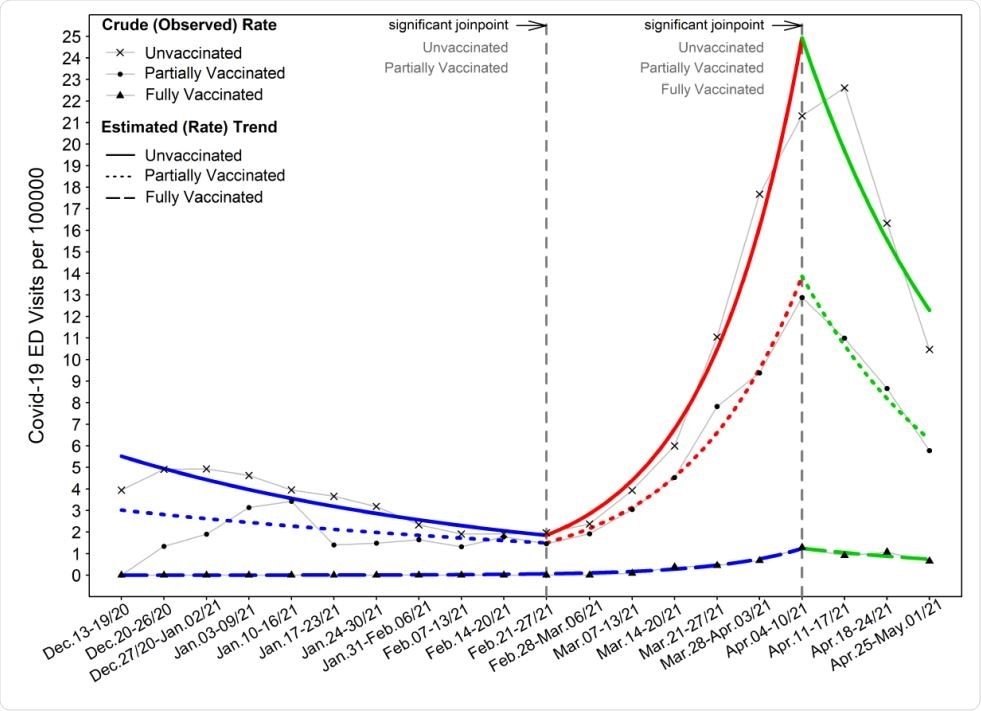Researchers in the United States have demonstrated the effectiveness of the Pfizer-BioNTech, Moderna, and Johnson & Johnson coronavirus disease 2019 (COVID-19) vaccines at reducing the need for emergency care or hospitalization following breakthrough infection with severe acute respiratory syndrome coronavirus 2 (SARS-CoV-2).
“While recent literature has shown the efficacy of the COVID-19 vaccine in preventing infection, its impact on the need for emergency care or hospitalization in breakthrough infections remain unclear, particularly in regions with a high rate of variant viral strains,” says the team from Beaumont Hospital in Royal Oak and Beaumont Health in Southfield, Michigan.
The team’s observational cohort analysis conducted across an eight-hospital acute care regional health system in Michigan found that emergency department visits and hospitalizations among fully vaccinated patients with breakthrough COVID-19 were extremely rare events, even despite the region having a high incidence of SARS-CoV-2 variants.
In cases where hospital-based treatment was required among the fully vaccinated, it was elderly patients with significant comorbidities who were at risk of severe outcomes, says Amit Bahl and colleagues.
A pre-print version of the research paper is available on the medRxiv* server, while the article undergoes peer review.
.jpg)
Real-world data on vaccine efficacy is still lacking
The COVID-19 pandemic that began in late December 2019 continues to cause significant morbidity and mortality globally, with the death toll now having reached more than 3.83 million.
While preliminary data from safety and efficacy trials of the Pfizer-BioNTech, Moderna and Johnson & Johnson vaccines have shown positive results, real-world data on their effectiveness is still lacking.
“Several small cohort studies and one large trial from Israel are currently our only insights into the actual rates of infection, hospitalization, and severe illness among vaccinated individuals,” says Bahl and the team. “Additionally, as COVID-19 variants emerge, we are in dire need of more data regarding the effectiveness of our current mass vaccination efforts.”
In-vitro studies have demonstrated that several variants of SARS-CoV-2 are more transmissible and less sensitive to infection or vaccine-induced antibodies than the wild-type virus.
“This is highly concerning, particularly in some regions in which new variant cases now outnumber the original wild-SARS CoV-2 strain,” writes the team.
The situation in Michigan
During the most recent surge of COVID-19, Michigan was the most severely impacted region in the United States.

Between the 5th and 12th April 2021, the number of new daily cases peaked at 7,000 and during a two-week period ending April 24th, ten SARS-CoV-2 variants were detected within the region.
Vaccination efforts in Michigan have been ongoing since December and approximately 42% of the state’s population was either partially or fully vaccinated as of April 30th , 2021,
However, “it is unclear if immunization efforts have helped the situation in this recent COVID-19 surge in a population with a high incidence of variant strain disease,” says Bahl and colleagues.
What did the researchers do?
The team conducted an observational cohort study using electronic health records across an eight-hospital acute care regional health system in Michigan.
The researchers analyzed 11,834 emergency care or hospitalization encounters due to COVID-19 that occurred between December 15th, 2020, and April 30th, 2021. They compared the rate of these encounters between unvaccinated (UV), partially vaccinated (PV), and fully vaccinated (FV) individuals.
The secondary endpoint was severe disease, represented as a composite outcome (ICU admission, mechanical ventilation, or in-hospital death).
What did the study find?
The rate of emergency department visits and hospitalizations was 96% lower in FV individuals than in UV individuals.
The cohort of FV patients with breakthrough COVID-19 infections comprised only 1% of COVID-19 emergency department visits.
“Within this group, we found that those who required hospitalization and developed severe illness were geriatric patients,” says the team. “Not surprisingly, similar to other vaccinations with reduced effectiveness in the elderly population, this geriatric group represented the population most at risk for serious adverse outcomes.”
The composite outcome (ICU admission, mechanical ventilation, or in-hospital death) occurred in 733 (6.8%) of the UV cases, compared with 85 (10.3%) of the PV cases, and just 16 (12.4%) of the FV cases.
Across all groups, there were 442 (3.7% of 11834) deaths, with 384 (3.5% of 10,880) occurring in UV patients, 50 (6.1% of 825) in PV patients, and 8 (6.2% of 129) in FV patients.
The rate of emergency care visits peaked at 22.61, 12.88, and 1.29 per 100,000 individuals for the UV, PV, and FV groups, respectively, between the 4th and 17th of April.
Fully vaccinated individuals substantially less likely to need emergency care or hospitalization
The team says the study shows that despite the high incidence of daily infections, with a majority caused by variant strains, fully vaccinated individuals remained substantially less likely to seek emergency care or become hospitalized.
“The need for emergency care and/or hospitalization due to breakthrough COVID-19 is an exceedingly rare event in fully vaccinated patients,” says Bahl and colleagues. “In cases of breakthrough COVID-19, if hospital-based treatment is required, elderly patients with significant comorbidities remain at high risk for severe outcomes regardless of vaccination status.”
“Future studies are needed to reassess vaccination efficacy broadly and by type of vaccine, as mutations and variants evolve,” they conclude.
*Important Notice
medRxiv publishes preliminary scientific reports that are not peer-reviewed and, therefore, should not be regarded as conclusive, guide clinical practice/health-related behavior, or treated as established information.
- Bahl A, et al. Vaccination reduces need for emergency care in breakthrough COVID-19 infections: A multicenter cohort study. medRxiv, 2021. doi: https://doi.org/10.1101/2021.06.09.21258617, https://www.medrxiv.org/content/10.1101/2021.06.09.21258617v1
Posted in: Medical Research News | Disease/Infection News
Tags: Antibodies, Coronavirus, Coronavirus Disease COVID-19, Efficacy, Hospital, Immunization, Mortality, Pandemic, Research, Respiratory, SARS, SARS-CoV-2, Severe Acute Respiratory, Severe Acute Respiratory Syndrome, Syndrome, Vaccine, Virus

Written by
Sally Robertson
Sally first developed an interest in medical communications when she took on the role of Journal Development Editor for BioMed Central (BMC), after having graduated with a degree in biomedical science from Greenwich University.
Source: Read Full Article
